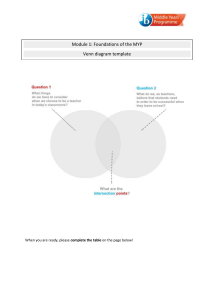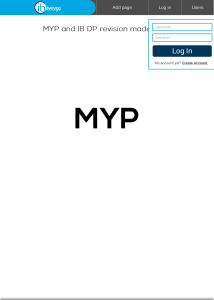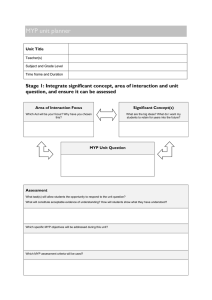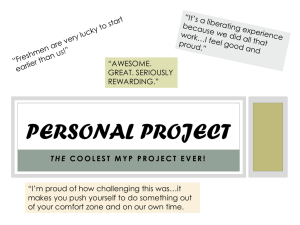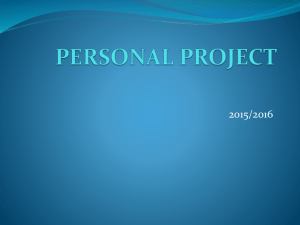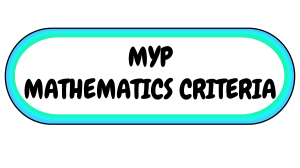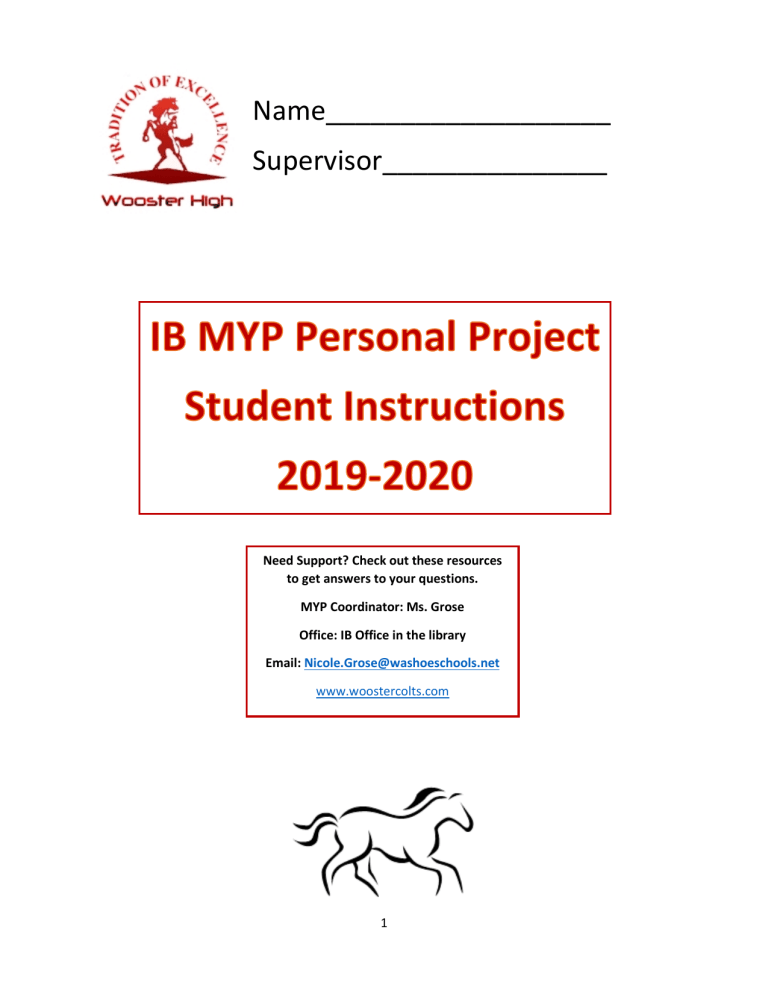
Name___________________ Supervisor_______________ Need Support? Check out these resources to get answers to your questions. MYP Coordinator: Ms. Grose Office: IB Office in the library Email: Nicole.Grose@washoeschools.net www.woostercolts.com 1 TABLE OF CONTENTS 3—What is MYP? Some IB Terminology and Explanations 4—What is the Personal Project? What is the Purpose? 5—Personal Project Cycle 6-7—Examples of Personal Projects 8-9—The Process/Timeline 10—ATL Skills 11-12—Brainstorming Possible Topics of Interest 12—Global Context 13—Goal Planning 14-15—More Examples of Topics in Different Global Contexts 15—What is the Role of my Supervisor? 16—The Report 17-20—Project Grading and Rubrics 2 As part of the IB program in grades 9 and 10, you are known as MYP students (Middle Years Program). MYP is designed for ALL students so that they will be exposed to the IB philosophy and skills, regardless of whether they decide to enter the rigorous IBDP program their junior year. There are many components to the MYP curriculum: • Internationalism: Preparing students to live in a global world will mean encouraging all students to take a second language and asking students to participate in the service of others • Real-World Relevance: MYP asks that all instruction be relevant, real-world, inquiry based and goal-oriented. (See “global contexts”) • Student-driven: the MYP philosophy asks that students reflect on their growth as a learner throughout the program. A goal of the MYP program is that they reflect on their growth using the “IB Learner Profile.” • Best practices in education: MYP asks that teachers design unit plans that utilize the best practices for students. MYP asks that all unit plans and assessments be made accessible for other teachers, students and parents and that they are submitted periodically for monitoring by the IB. . All curriculum is designed to assess growth in these skills, building complexity of tasks as students grow in the program and culminating in the Personal Project during grade 10. • • • • • Social Skills Communication skills Thinking skills Research skills Self-management skills Students are encouraged to: • • • • Ask challenging questions Learn how to learn and then reflect on their own learning Develop a strong sense of their own identity and their culture Develop the ability to communicate with and understand people from other cultures These are links to the “real world” application of all academic content. There are six designated MYP contexts. These are used as different “lenses” with which to view the curriculum: • Identities and Relationships: Who are we? Who am I? • Orientation in space and time: What is the meaning of when? And where? • Personal and Cultural expression: What is the nature and purpose of creative expression? • Scientific and technical innovation: How do we understand and impact our world? • Globalization and sustainability: How is our world connected? • Fairness and Development: What are our rights and responsibilities? 3 The final component of the MYP program is the Personal Project at the end of the 10th grade year. The project is designed to be a culminating task to showcase your ability to learn on your own and utilize the skills you’ve been practicing before this point. 1. This project asks you to create a product or event that is personal for you, represents your goals, and is appropriately challenging for you! This could really be almost anything. Some ideas are: • A campaign for a cause you are passionate about • An original piece of artwork • A written piece of work on a social or cultural issue • A piece of creative writing • An invention or science experiment of interest to you • Organizing a special event • Starting a community or school organization 2. The project must also demonstrate the following: 1. Learning through action (by experiencing and doing something) 2. Learning on your own—using a variety of skills (IB calls these skills “ATL skills” or “Approaches to Learning” and they include skills like investigating, communicating, collaboration, critical thinking, and reflecting) 3. Applying previous academic learning from your classes to your personal goals 4. Reflecting on your learning, your strengths, weaknesses and ability to overcome challenges 5. Creating a goal that is relevant and important for today by justifying it’s importance using one of IB’s “global contexts” This is FOR YOU! The final product will be demonstrated to your teachers and classmates in an exhibition in April, but the reflection and the process is about YOU! At the end of the process, it isn’t about a grade in one class—it’s about reflecting on your strengths and weaknesses and about how you want to move forward. How do you want to improve and challenge yourself during your last years of high school and beyond that? 4 5 1. Creating a website for a community basketball league 2. Campaigning to encourage re-usable grocery bags 3. Putting on a play at an elementary school about bullying 4. Learning about nutrition and exercise to lead a campus fitness support group 5. Learning to use a specific type of camera or technique to improve your photography skills 6. Creating a “how to survive high school” tutorial for incoming 9th graders 6 7. Designing and sewing an outfit made out of recycled materials 8. Planning a vacation 9. Designing a budget for a future business 10. To raise awareness of other cultures at the school through a poster campaign 11. To organize a fundraiser to help the children’s hospital 12. To create a short film on teenage insecurities 13. Creating video tutorials on specific basketball skills to help the school’s team and coaches 14. Creating a travel brochure to promote student’s hometown 15. To research, create and market diabetic chocolate 16. To create a sensor detecting a ball passing the goal line 17. To write an article on the psychology of laughter and submit to the local paper 18. To write a children’s book on being environmentally friendly 19. To record an album for a band 20. Making my own music video 21. Creating a book of poetry from local poets as a collection 22. Designing a solar powered model boat 23. Turn a poem into a script for a movie 24. Learn to play an instrument and record a song 25. Interview grandparents, parents and teens to document generational divide on specific issues Pictures taken from Global Jaya International School 2012 Personal Project Exhibition Slide Show http://www.slideshare.net/PakLiam/gjis-ib-myp-personal-project-sample 7 INVESTIGATING: • Beginning a process journal to document the entire process for submission at the end • Brainstorming and then selecting a personal goal for yourself, anything of interest to you • Selecting a specific global context with which to focus the goal • Researching your goal • Investigating how to best achieve this goal and how to best demonstrate that to others • Being assigned a supervisor/teacher who will meet with you at least 3 times to discuss progress and help guide you throughout the next 6 months PLANNING • Creating a product proposal and meeting with your supervisor to discuss any challenges and to outline your goal • Continuing to add to your process journal to document your process • Creating a checklist or rubric that explains the criteria to evaluate the success of your own goal TAKING ACTION • Creating the actual product/outcome that would demonstrate your goal (supposed to spend around 25 hours for the entire 6 months of the project) • Actively working toward the goal and gathering documentation of the entire process In the process journal • Documenting any problems along the way or challenges • Discussing challenges with supervisor REFLECTING • Reflecting and evaluating your learning and the process—demonstrating metacognition. • Demonstrating your learning through a report/presentation PROJECT TIMELINE PROJECT PHASE STARTING ENDING INTRODUCTION TO THE PROJECT 8/14/2019 8/14/2019 STAGE 1: INVESTIGATING YOUR GOAL 8/14/2019 9/18/2019 STAGE 2: PLANNING YOUR PROCESS 9/18/2019 10/30/2019 STAGE 3: TAKING ACTION 10/30/2019 12/11/2019 STAGE 4: REFLECTING, REPORTING, & SELF-EVALUATING 12/11/2019 2/19/2020 2/19/2020 SUMBISSION OF REPORT, BIBLIOGRAPHY, PRODUCT/EVIDENCE AND JOURNALS 8 1. Personal Project Coversheet 2. 10 process journal entries (you can always have more but 10 are submitted) 3. Bibliography of sources 4. Report/presentation a. Written: 1,500-3,500 words b. Electronic (website, blog, slideshow): 1,500-3,500 words c. Oral (podcast, radio broadcast, recorded): 13-15 minutes d. Visual (film): 13-15 minutes 5. Any artifacts from presentation or product (optional) 6. Academic Honesty form summarizing at least 3 Supervisor meetings Your final Personal Project score is given by your supervisor and is scored using the IB rubrics. The scores are moderated and samples are sent to IB. Remember that your final scores isn’t necessarily based on the product but the process! The process journal is where you record your learning process and any planning you do toward achieving your goal. It is where you record your ideas, thought and an action plan for the project. The journal notes are used to write your report. If you keep detailed notes on your process, then the report will be easier to write at the end. You will select 10 journal entries that help to support your report. The journal can also include artifacts and photographs from your process. Some ideas for things to put into the process journal might include: • Lists of ideas/brainstorms/notes and any other piece of the process • Photographs • Screen shots • Interview notes with anyone who helped you, including your supervisor • Notes from various sources (like a documentary you watched, book your read, etc.) • Examples of other similar goals or products where you gathered ideas • Drawings or sketches • Quotes that inspired your goal/product • Anything else that contributed to your process Be sure you are demonstrating and reflecting in your journal about your use of all of the ATL skills below. Which ones were challenges for you and at what stage? 9 • • • • • • • • • • • • • • • • • • • • • • • • • • How did you delegate responsibility, build consensus and make fair decisions? (if in a group) How did you listen to many perspectives or pieces of advice? How did you negotiate with others? How did you take responsibility for your actions How did you build relationships? How did you communicate with a variety of audiences How did you interpret and use non-verbal communication How did you include intercultural understandings? How did you use a variety of forms of writing or speaking? How did you forecast possibilities and troubleshoot problems? Develop opposing arguments? Create original ideas and make unexpected connections Design new improvements or solutions Consider multiple alternatives Make connections between various subject groups and disciplines How did you collect, record and verify your information? How did you evaluate and select information? How did you understand and use technology systems effectively Use a variety of sources and media networks? Compare, contrast and draw connections between many sources? How did you keep an organized and logical system for recording your progress? Set goals that were both challenging and realistic? Bring necessary materials and supplies? Plan strategies and plans to prepare for success and minimize obstacles Meet deadlines? Persevere over obstacles? Reduce stress? How did you motivate yourself to get it done? How did you reflect on your learning and reflect on your mistakes to learn from them? 10 Issues I think are currently important to the world right now ____________________________________________ Hobbies and sports that interest me ____________________ ____________________ ____________________ ____________________ Places I want to visit When I want to be creative I… ______________ ______________ ______________ ____________________________________________ _________________________________________________ ____________________ ____________________ ____________________ ____________________ ____________________ ____________________ ____________________ ____________________ Interesting topics I’ve studied in school _________________________________________ ______________________________________________ ______________________________________________ Jobs I want to know more about ______________ ______________ ______________ People that I admire ____________________ ____________________ Things I’m good at _________________________________ _____________________________________ _____________________________________ Things I’d like to get better at _________________________________ 11 _____________________________________ _____________________________________ ____________________ ____________________ ____________________ ____________________ Happiest moments… When I want to relax I… ____________________ ____________________ ____________________ ____________________ ____________________ ____________________ ____________________ ____________________ At my high school reunion, I’d say ____________________ ____________________ ____________________ ____________________ ____________________ ____________________ ____________________ ____________________ When I tell people about my community… ____________________ ____________________ ____________________ ____________________ ____________________ ____________________ IB requires that you explain how your topic fits into ONE of the “Global Contexts” Why? ---IB wants you to select a topic that is relevant to you personally, but also to the “real-world” and how you understand your role in it. You will not only research how your project is important in this context but you must explain how your goal and product relate to the context that you choose. For example, if I’ve chosen the topic “RAP MUSIC” for my personal project, here’s how it could look in different contexts: Idea! In your journal…write one of your topics and see how it could relate to different contexts 12 Before you can begin the investigation process, you must have a few ideas for a goal that you can narrow down. This is the beginning of the process journal. Some ideas might include: Think about…. S M A R T Specific---Be very clear about what exactly do you want to accomplish? Measureable--How will we measure this? Reminder that after you write in your journal, you should reflect on which of the ATL skills you used in that step of your process. Achievable— Is it appropriately challenging for you to learn something from the process? Relevant and Recorded--Is this goal relevant to my life and the world I live in? Time-Bound--Is it realistic in the time frame or do you need to revise Topic Goal Fighting prejudice Create a short play to raise awareness of the impact of prejudice on individuals By the end, your journal should have all the ATL skills included Specifications (see above SMART GOALS) Must be a 20 minutes play appropriate for ages 11years + and include the theme of prejudice and its impact (defined after further research) There must be a tool to evaluate the play such as a questionnaire 13 My product or outcome The global context The play Rights and Responsibilities because I want students who watch the play to see their personal responsibility in standing up to prejudice Identities and relationships • Two sides of social networking; an awareness campaign about digital citizenship and cyber bullying • How online identities impact offline relationships; a school article • Keeping culinary traditions; a video series following family recipes with historical relevance • • The effect of mass media on teenage identity; a short film The Euclidean space perspective of the universe; a 3D model Students will explore personal histories; homes and journeys; turning points in humankind; discoveries; explorations and migrations of humankind; the relationships between and the interconnectedness of individuals and civilizations from personal, local and global perspectives. • Explorers in search of a new world; immigration over the ages through visual texts • The Mayflower and the dream of religious freedom; a personal family history • Charting a family history through archives and a representational statue Personal and cultural expression • Video games as a form of cultural expression; a short film using five video games that shows how they are an expression of our culture • The art of Manga in Japanese culture; a Japanese anime and a survey of the understanding of my peers Students will explore identity; beliefs and values; personal, physical, mental, social and spiritual health; human relationships including families, friends, communities and cultures; what it means to be human. Orientation in space and time Students will explore the ways in which we discover and express ideas, feelings, nature, culture, beliefs and values; the ways in which we reflect on, extend and enjoy our creativity; our appreciation of the aesthetic. Scientific and technical innovation • Students will explore the natural world and its laws; the interaction between people and the natural world; how humans use their understanding of scientific principles; the impact of scientific and technological advances on communities and environments; the impact of environments on human activity; how humans adapt environments to their needs. Globalization and sustainability Students will explore the interconnectedness of human-made systems and communities; the relationship between local and global processes; how local experiences mediate the global; the opportunities and tensions provided by world interconnectedness; the impact of decision making on humankind and the environment. Culture and self-expression through dance at the local community arts centre; a performance Nano fibres build stronger bikes; a prototype bike with nano fibres • What’s the matter with the anti-matter?; an informational talk • Why are genetics and genomics important to my health?; a media presentation • Can stem cells replace organ transplants?; an report • The struggle for water in developing countries; an awareness campaign • The impact of the financial crises of Europe and the European Economic Community on the United States; a visual presentation Education as the tool to change the future of Peru; a workshop for adults The role of the developing countries in protecting the tropical rain forest; a collection of slides Continued on next page….. 14 Fairness and development Students will explore rights and responsibilities; the relationship between communities; sharing finite resources with other people and with other living things; access to equal opportunities; peace and conflict resolution. • Supporting fair trade: Cocoa trade in Ghana; an awareness campaign for our school restaurant/cafeteria to promote fair trade • Open-market economies and their role in fair trade; a talk for students • Exploring the intersections of race and inequality; a radio broadcast • Asylum seekers and their right to live like us; a painting Your report is divided into 4 sections. Each section contains specific information about each of the 4 stages of this project: A. Investigating 1. Clarify the goal, it’s challenge to you and how it fits into which global context (see pg. 12) 2. These four sections are graded Describe prior learning and subject-specific knowledge that is relevant 15 3. B. Include your research regarding your goal and describe your research skills Planning 1. Criteria for evaluating the product/outcome 2. Plan and record the process (types of documentation vary depending on the goal but should be recorded in the process journal) 3. Self-management/time management—process journals should reflect this stage greatly and be referred to (but students should avoid repeating the journal entries directly) 4. Three supervisor meetings are included and described C. Taking Action 1. Creating the product/outcome 2. Demonstrating thinking skills 3. Demonstrating communication and social skills D. Reflecting 1. Evaluate the quality of their product using their criteria 2. Reflect on how completing the project has extended their knowledge and understanding of the topic and the global context (real world significance) 3. Reflect on personal development in the IB Learner Profile The report doesn’t have to be written…it can be a blog, website, slideshow, podcast, recorded film. However, it must be separate from the product/goal. This means that if your goal was to create a website than your report cannot be the actual website (although you can include your report on the website if you want) but it should be a separate piece of work from the product/goal. Below are some guidelines for your report: Format Written Report Electronic Report (website, blog or slideshow) Oral Report (podcast, audio recording or visual film) Time (audio or Length requirement 1500-3500 words 1500-3500 words Word Limit audio-visual recording) 15-15 minutes 16 3 minutes AND 1200-2800 WORDS 6 minutes AND 900-2100 WORDS 9 minutes AND 600-1400 WORDS 12 minutes AND 300-700 WORDS Your supervisor will use these rubrics to assign your project a score 1-8 in each of the 4 criteria. Your supervisor will then give you a total score out of 32 points (4 criteria x 8 points each=32). Your total score is then converted into a final “IB Score” using the IB Final Grade Calculation chart at the end. In order to receive an IB certificate for MYP participation, you must score 4 or higher. 17 18 19 20

